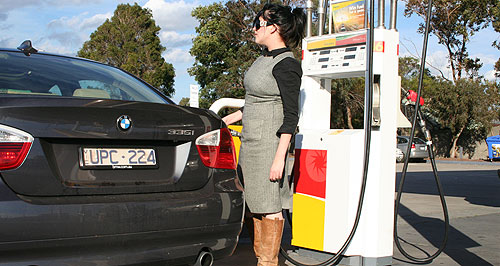Make / Model Search
News - General News - GovernmentGreens stall on $2.3bn fuel excise levy supportGreen day: Senator Christine Milne says the Greens have withdrawn support for the indexed fuel levy because it was earmarked for roads, and excluded public transport initiatives. Plan to index the fuel excise twice a year falls foul of the Greens24 Jun 2014 By BARRY PARK THE Greens have torn open a $2.3 billion hole in the Abbott government’s budget, revealing to the ABC this morning that they would withdraw support for an increase in the fuel excise levy. The turnaround, not unexpected after weeks of political posturing following the budget, means that the coalition government will not be able to peg increases in the 38-cent-a-litre fuel levy to the cost of living from August 1 this year, with the levy indexed twice a year. The excise was expected to add about a cent a litre to the price of fuel each time it was indexed. The Greens had previously thrown their support behind the levy as it would have discouraged vehicle owners from driving, and reduce overall emissions, but only in the understanding that a portion of the revenue raised through the excise would be spent on public transport projects, and not just roads. Greens leader Senator Christine Milne said at a press conference this morning that it was clear the Abbott government wanted to use the excise revenue to build roads. “The Greens are saying here ‘we want transformative, legislation in Australia that helps us move to a low-carbon economy that helps people move onto public transport, that improves the amenity of our cities and brings in mandatory vehicle fuel efficiency standards to help people to be able to drive less, and to drive more efficiently’,” Senator Milne said. “The prime minister and the treasurer have said clearly that there will be no compromise on this, and (treasurer) Joe Hockey said about a month ago that as a matter of principle for them, that they wanted to raise money for roads, and they would not negotiate with the Greens. “Well, this is their crash and crash-through policy they are not going to get a big hit on families who have no alternative with public transport, no alternative with fuel-efficient vehicles, just a revenue raiser to build the roads that people don’t want.” Senator Milne said that the loss of the Australian car-making industry – Ford has announced it will quit Australian manufacturing in 2016, while Holden and Toyota will follow it out the door a year later – meant it was also time to take a deeper look at introducing mandatory vehicle fuel efficiency standards here. “The hypocrisy of the prime minister telling (US) president (Barack) Obama that fuel excise is a climate change price signal, and then here in Australia using that money to build roads and make pollution worse just shows the hypocrisy of what we’re dealing with,” she said. “The Greens have been trying to get mandatory vehicle fuel efficiency standards in Australia for a long time and in the period of the last government we pushed very hard. But the reason that the previous government wouldn’t accept it, or the opposition, is because the cars we made in Australia are not fuel-efficient, and that’s why we couldn't get any headway on it,” Senator Milne said. “Now that the whole structure of the motor vehicle industry in Australia is changing, I think there’s a good opportunity for us to now get mandatory vehicle fuel efficiency standards. “That’s what President Obama will be pushing for at the G20, the climate change authority will be coming out with their report on mandatory vehicle fuel efficiency standards, and that’s where this debate will shift.” The latest Australian corporate average emissions figures for 2013 published by the National Transport Commission shows that local car-makers from Ford and Holden showed some of the smallest gains in showroom carbon dioxide emissions averages of all the car brands on sale here. Toyota, which builds its Camry Hybrid sedan at Altona and includes a number of hybrid models in its mix, middled the field in terms of reducing CO2 averages. While smaller, more fuel efficient cars are more common on Australian roads, buyers are continuing to favour less fuel-efficient SUVs, with the high-riding wagons dominating sales last year.  Read more |
Click to shareGeneral News articlesResearch General News Motor industry news |











Facebook Twitter Instagram